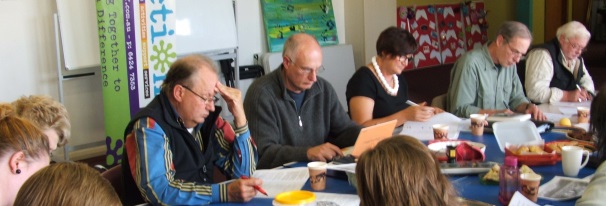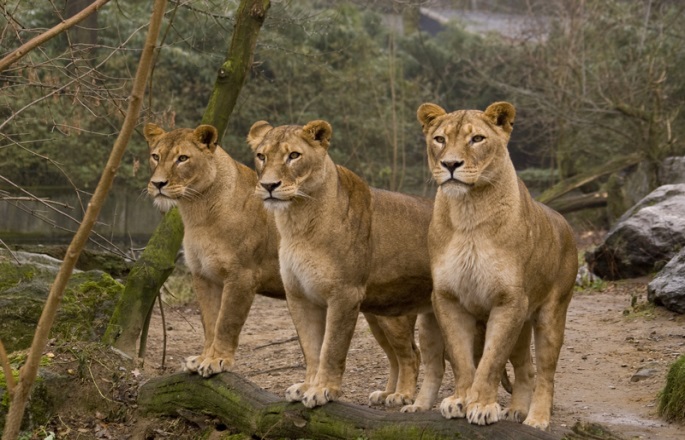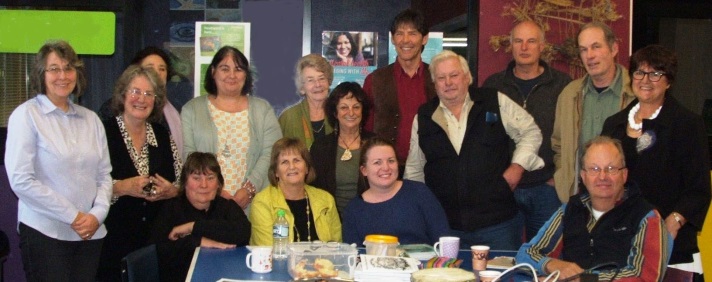 With the assistance of my trusty editor/partner in crime and beloved wife, Zoë Lake, I conducted a writer’s workshop seminar on the first of June this year. This Devonport Writers Workshop group, organised by Fay Forbes, has been running consistently, September through May, every year for the past eighteen years and each year the workshop participants produce an anthology of their work: poetry, essays, flash fictions, slice of life short stories and much more. Within this diverse group of individuals: school teachers, bush poets, business men and women, and housewives, who write for the sheer joy of writing, are many talented writers; some of whom have been published.
With the assistance of my trusty editor/partner in crime and beloved wife, Zoë Lake, I conducted a writer’s workshop seminar on the first of June this year. This Devonport Writers Workshop group, organised by Fay Forbes, has been running consistently, September through May, every year for the past eighteen years and each year the workshop participants produce an anthology of their work: poetry, essays, flash fictions, slice of life short stories and much more. Within this diverse group of individuals: school teachers, bush poets, business men and women, and housewives, who write for the sheer joy of writing, are many talented writers; some of whom have been published.
We began, as you might imagine by the title, with a discussion on inspiration, motivation and whatever in general provides the stimulus for writers to write. As most of you know, the muse comes in many forms but the main ones that came up were:
1. Something they were simply born to do
2. Someone who inspires their creativity
3. An inspirational experience: seeing or being part of a potentially fatal incident or other possible life changing experience
4. Through dreams or, seemingly spontaneous ideas and visions
The conclusion we came to, whatever the source of inspiration, was to treasure it and to never take it for granted. The muse can be a fickle ally, a capricious confidant that slips out the back door without so much as a by your leave; leaving you staring, despondently at a blank page.
If inspiration taps you on the shoulder, regardless of the circumstances, capture it in writing as quickly as you can. Always have something handy to help you in that endeavour, whether it be notepad, laptop, pen and paper or dictaphone; just as long as you get it down before it disappears into the aether like a dream.
Narrative Mode
We explored narrative mode in some depth. I was surprised that most of these talented writers had not previously explored this subject. They were certainly aware of the concept, but only in as much as each writer has a particular voice, which of course is a choice, and they wrote generally in whatever one came naturally to them. And so we looked at the overlapping areas that the narrative mode encompasses, most importantly: ‘point of view’, which of course determines through whose perspective the story is narrated, and the fact that the narrative voice determines a set of consistent features regarding the way in which the story is communicated to the reader.
We talked about the various POVs and discussed the advantages and disadvantages of each and why, even if you chose to stick to the one you are most comfortable with, it is advantageous to understand the available options, their strengths and weaknesses. I previously published quite an in depth post on the subject of writing perspectives here at IU in November of last year, and so I’ll just briefly describe the exercise I gave them to expand their experience of using the different perspectives.
A Tense Exercise
The exercise in perspectives I set for them was a fairly simple one but from it we had some interesting variations on a theme. I gave them a subject and a picture and asked the group to write a flash fiction in 200 words or less in first person, past tense.

Image by © Roy Janssen | Dreamstime.com
I then asked them to do the same story but to change it to present tense. I finally asked them to write the story in any tense they liked but to change the tense at some point, effectively using it as a device. In other words it had to work.
The Editing Processes
Zoë dealt mostly with this part of the workshop, talking about the various ways they could clean up their manuscript before sourcing an editor; basically, the cleaner the manuscript the less expensive the editing job. She talked about the different kinds of editing: developmental editing, copy editing, proofreading, formatting, book evaluation et cetera and the various costs involved. And after some questions concerning the huge discrepancies in what editors charge., she simply explained that, as in anything, you generally get what you pay for.
Publishing (which way to go)
Finally we talked about publishing. I basically told them that there has never been a better time for the struggling author to reach publication. Until recently, the goal of getting published was beset with a long, arduous road filled with rejection and delays and, in most cases, never actually ending up with a published book. I explained that, through advancements in technology and changes in consumer shopping habits over the past ten years, it is possible for more writers to become published authors than ever before, making this the best time in history to be an author.
Getting published once required securing an agent, submitting proposals and then waiting for a response… and waiting… and waiting… and waiting…
Now, while that traditional path is still available (more perilous than ever), the more preferred path to publication for many writers (myself including) is independent publishing.
We finished by saying that, to succeed as an independent author/publisher, one needed to develop many more skills than just writing a story, emphasising the necessity for constant endeavour in pursuit of perfection in all the skills involved.


Sounds like a great group, TD; they are lucky to have you and your wife. I love the fact that you produce an anthology. There’s no better validation and inspiration to keep going than to see their words in print. Good on you!
Yes they are a great group, Melissa, and it was a worthwhile experience to work with them.
Thank you so much for dropping by and commenting, Melissa.
That flash fiction exercise looks like a wonderful way to get a firm grip on the different perspective. Great idea.
And 18 years? That’s quite an accomplishment. I can imagine the growth of the members over that time.
Over the years their number has fluctuated considerably; apparently there were around twenty six this year but when the season finished, in May, quite a few went on holiday.
I met Fay when I delivered an ePublishing seminar at the local library and she asked me to open one of their annual anthology evenings a couple of years ago; we’ve kept in touch ever since.
This was my third contact with the group; I think they enjoyed the flash fiction challenge to their usual, comfortable sense of voice, Yvonne, and they did produce some interesting variations on perspective.
Thank you so much for dropping by and commenting today, Yvonne.
Your writing seminar sounds like exactly what I needed in 2011.
The exercises and excellent advice that you imparted will save your attendees a lot of headaches. Your final tip, that this career requires constant endeavor, is right on.
My muse never deserts me. On the contrary, she fills my head with devilish characters and too many stories. 😉
That’s basically what I had in mind, Lois, something that I might have found helpful at some stage earlier on with my writing. I didn’t actually have anything to model the workshop/seminar on, as I never personally attended a writing workshop.
I believe the attendees had some fun, talking about an area of their lives that they obviously love, and expanding on their experience and knowledge of it.
You are fortunate, as am I, that you have an active muse but unless we nail the idea, character, story down it floats away; I think that is the main difference between those who tell stories and those who do not (who just allow their imaginings to drift away like so much flotsam).
Thank you so much for dropping by and commenting, Lois.